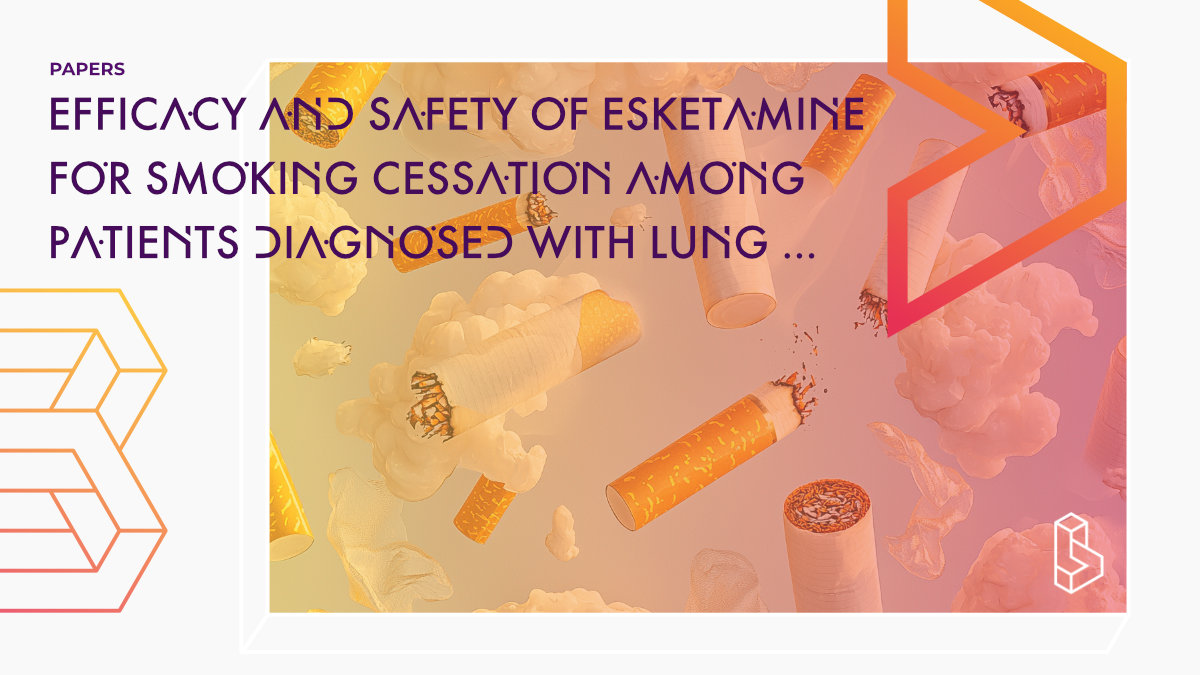This multicenter, randomised, placebo-controlled clinical trial (n=236) investigates the efficacy and safety of esketamine (ESK) (8x35mg) for smoking cessation in patients with lung cancer and major depressive disorder (MDD). Eight weekly intranasal ESK sessions significantly improved both self-reported (44.1%) and biologically verified (28.8%) smoking abstinence at 6-month follow-up, alongside reductions in depression, anxiety, nicotine dependence, and respiratory symptoms.
Abstract Efficacy and safety of esketamine for smoking cessation among patients diagnosed with lung cancer and major depression disorder
“This multicenter, randomized, placebo-controlled, clinical trial was designed to investigate the efficacy and safety of esketamine (ESK) for smoking cessation. The study enrolled a sample of 236 patients diagnosed with lung cancer and major depression disorder (MDD). Treatment included intranasal delivery of ESK or placebo once a week for 8 sessions. The primary outcomes were self-reported and biologically verified continuous abstinence rates at the end of 6 months follow-up visit. The second outcomes were the severity changes of depression and anxiety. The cognitive function, the nicotine dependence, urge to smoke, respiratory symptoms and adverse events were also examined. We found that 8 sessions of ESK treatments significantly improved the self-reported (44.1 %) and biologically verified (28.8 %) continuous abstinence rates. Additionally, the severity of both depression and anxiety was also significantly relieved by ESK delivery. Furthermore, ESK was capable of improving cognitive function of the participants. Finally, the nicotine dependence, urge to smoke and smoking related respiratory symptoms of ESK group were also alleviated at the completion of follow-up. No serious adverse events were observed throughout the study. This clinical trial provides evidence that ESK treatment is efficacious and safe for quitting cigarette smoking among patients with lung cancer and MDD.“
Authors: Xinya Hong, Sen Xu, Gaozhong Sun, Yusi Liu, Wanqing Yi, Qiyun Hu, Wanwen Li, Junyun Liu, Fengle Wu, Ming Yu, Yifei Lou, Zhenhua Wang, Zhenzhen Xu, Caiyun Fang, Huiling Yang & Wenyuan Wang
Summary of Efficacy and safety of esketamine for smoking cessation among patients diagnosed with lung cancer and major depression disorder
Cigarette smoking remains a leading, preventable cause of death worldwide and continues to exact a heavy toll on people already coping with lung cancer. Early cessation after a cancer diagnosis reduces both mortality and the risk of second tumours, yet quitting is notoriously difficult, particularly for individuals with major depressive disorder (MDD). Depression roughly doubles the likelihood of daily smoking, and cessation itself can temporarily worsen mood and anxiety. Esketamine—an enantiomer of ketamine licensed for treatment-resistant depression—offers fast-acting antidepressant effects via N-methyl-D-aspartate (NMDA) receptor antagonism, but its potential to aid smoking cessation has not previously been tested. Hong and colleagues therefore designed a randomised, double-blind, placebo-controlled trial to evaluate whether intranasal esketamine could simultaneously improve mood and promote abstinence in smokers with lung cancer and comorbid MDD.
Methods
Setting
Find this paper
https://doi.org/10.1016/j.jad.2025.04.077
Paywall | Google Scholar | Backup | 🕊
Cite this paper (APA)
Hong, X., Xu, S., Sun, G., Liu, Y., Yi, W., Hu, Q., ... & Wang, W. (2025). Efficacy and safety of esketamine for smoking cessation among patients diagnosed with lung cancer and major depression disorder: A randomized, placebo-controlled clinical trial. Journal of Affective Disorders.
Compound Details
The psychedelics given at which dose and how many times
Ketamine 35 mg | 8x
